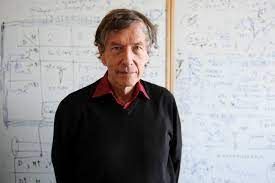Department of Mathematics, Physics and Informatics,
and Director of International Centre for Theory of Quantum Technologies (ICTQT),
University of Gdansk, Poland
marek.zukowski@ug.edu.pl
CV: (https://orcid.org/0000-0001-7882-7962)
PhD (1983, Univ. of Gdansk);
Dr habilitatus (1995, Institute of Physics, Nicolaus Copernicus University, Torun),
Full titular professor (since 2003, The President of Poland),
corresponding member of Polish Academy of Sciences (since Dec 2019).
Current Position full professor, director of International Centre for Theory of Quantum Technologies, University of Gdansk (UG)
VISITING POSTIONS:
University of Innsbruck (Collaboration with Prof. Zeilinger): Gastprofessor, full academic year 1991-1992; four months in 1993; 1 month in 1994, 1 month, 1995; Gastprofessor and guest researcher (OeAD)- 7 weeks, in 1996, 5 weeks in1997; over two months in 1998.
University of Vienna: Gastprofessor, 1 month, 2001; teaching appointment June 2002; Universitaetsprofessor two months in 2004); full winter semester in 2005/6, winter semester 2010/11; winter semester 2017/18.
Tsinghua University, Beijing, Chair professor (October).
University of Science and Technology of China (USTC), visiting distinguished professor – altogether 3 months
University of Singapore, visiting scientist (4 months)
Short term visits at University of Munich and Stockholm.
FELLOWSHIPS AND AWARDS:
The Prize of Foundation for Polish Science (FNP, 2013), Poland
Copernicus Prize (with Harald Weinfurter) DFG/FNP (2014), Poland/Germany
Hevelius Prize, City of Gdansk (received: Jan. 2016)
Marie Sklodowska-Curie Prize of III Div of Polish Academy of Sciences (2013), Poland
Prizes of the Minister of Science 1983,1994,2000,2007,
Rector of UG Prizes 1986,1993,1994,1998,2005, Poland
Wenner Gren Stipend, Stockholm (2006).
IQOQI-Vienna Fellow (awarded 2023)
INTERNATIONAL COLLABORATIONS:
Austria:7 Programmes on Quantum Communication and Quantum Information (1996-2009 co-coordinators: A. Zeilinger, later C. Brukner),
Germany:5 Programmes on Novel Entangled States (2003-2012, DAAD- Polish Ministry) co-coordinator Weinfurter.
Other collaborations: Stockholm University, NU Singapore, USTC Hefei, MPL Erlangen.
SCIENTIFIC INTERESTS: Quantum Physics, Quantum Information, Quantum Optics
PUBLICATIONS: over 160 papers (out of that 2 Nature, 2 comments in Nature, 28 Physical Review Letters, 1 PRX, 1 PNAS, 1 Reviews of Modern Physics); ISI Web of Science: h-index 39, citations: 8600 (Web of Science); h=51. 14900 (Google Scholar).
MAIN RESULTS: physical conditions for optical entanglement swapping, quantum teleportation, and multiphoton interference (1993,1995,1997). Full set of multipartite correlation Bell-CHSH inequalities (2001,2002), schemes for d-dimensional optical interference and entanglement (1997), first proof of their high-non-classicality (2000, numerical), observation of 4-photon (2003) and 6-photon interference (2009), observation of interference of fully independent photons (2006), experimental falsification of Leggett-type models for correlations (2007),suggestion of Information Causality as a general principle of physics (2009), equivalence of Bell inequalities and communication complexity problems (2004), new entanglement indicators (2008), weak measurements with parametric down conversion (2012), “Quantum Bridge” – application of quantum information to a card game (2014). New definition of Stokes observables for quantum light (2015), nonclassicality measures for quantum optics (2016-)
Lecture 35: Marek Żukowski
" Einstein-Podolsky-Rosen Paradox, Bell's Theorem, entanglement, GHZ paradox , ‘nonlinear’ crystals, quantum teleportation, and Nobel Prize 2022"
Marek Żukowski
Department of Mathematics, Physics and Informatics,
and Director of International Centre for Theory of Quantum Technologies (ICTQT),
University of Gdansk, Poland
marek.zukowski@ug.edu.pl
Nobel in Physics 2022 citation: “for experiments with entangled photons, establishing the violation of Bell inequalities and pioneering quantum information science”.
To give the essence of this 60 year efforts, I shall talk about:
-Developments which led to 2022 Nobel prize:
-Resume on the EPR-paradox (1935), Bell’s comment on that (1964).
-Clauser’s better Bell inequalities (1969-74), proposal of an experiment (1969), and the first experiment (1972).
-Aspect masterpiece versions of Clauser experiments (1982).
-The mood of the times (1935-1990). Reemergence of interest in Bell-type photon correlations (1990- ). Loopholes in experiments.
-Spontaneous Parametric Down-conversion (1970): the work horse in optical Bell tests (1994).
-G-H-Zeilinger correlations (1989). Entanglement swapping as the path to observable multi-photon entanglement/interference (1993).
-Birth of quantum information science (1984-1994).
-Innsbruck teleportation experiment (1997) + other ones.
-Post Scriptum: 2015-2017 loophole free Bell experiments.
The talk will be non-technical, a discussion of basic concepts and developments.


